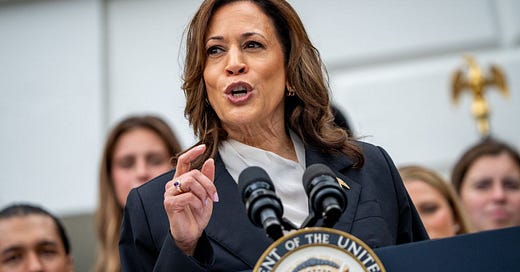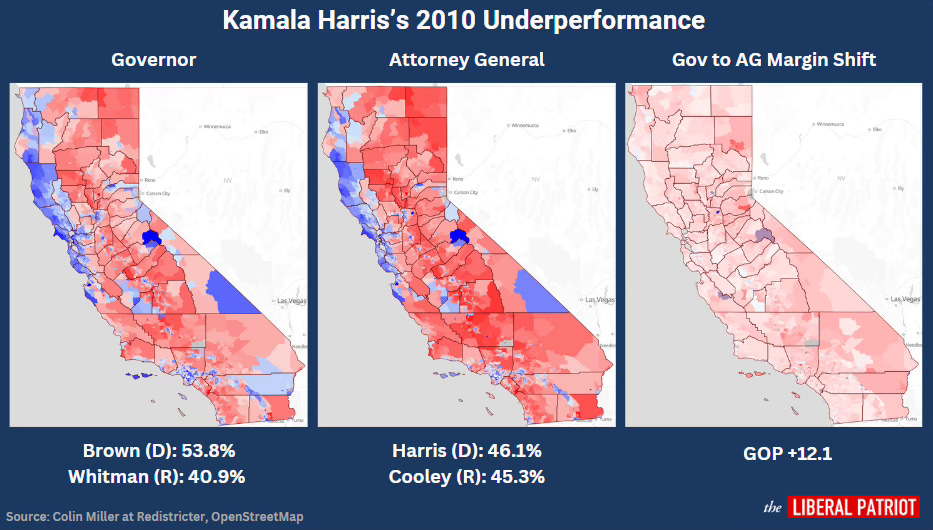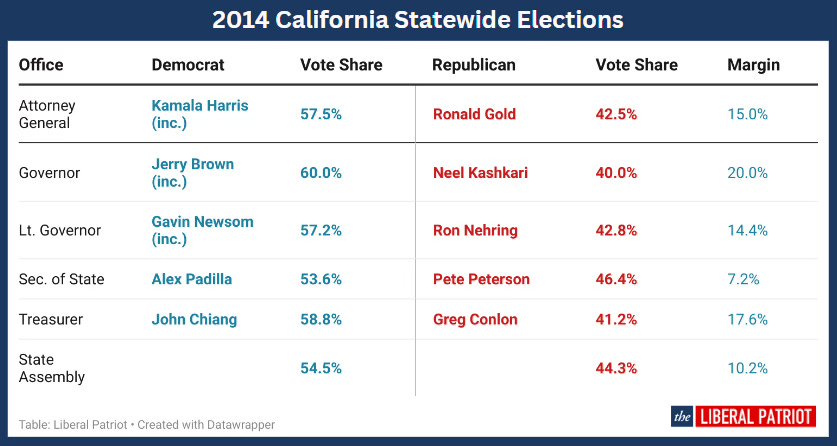Since receiving President Biden’s endorsement shortly after he dropped out, Vice President Kamala Harris has quickly unified the vast majority of elected Democrats. Convention delegates, too, have already promised their support in Chicago next month. Harris suddenly seems a lock for the nomination—despite not receiving a single vote in the 2024 presidential primary. And four years ago, during her short-lived 2020 White House bid, she didn’t receive a single vote either.
So what can her limited electoral history tell us about her chances in November? Let’s take a look.
Harris first ran for California Attorney General in 2010 after two terms as San Francisco’s District Attorney. She won by the narrowest of margins, 46.1 percent to 45.3 percent, against Los Angeles County DA Steve Cooley. 2010 was certainly a disastrous year for Democrats, but Harris’s 0.8-point victory is nevertheless notable—particularly when compared to other statewide Democrats.
Jerry Brown won the governor’s race by 13 points and Gavin Newsom won the lieutenant governor’s race by 11. Senator Barbara Boxer won reelection by 10. Other statewide Democrats pushed closer to 20-point victories. Harris’s nail-biter certainly sticks out.
A portion of Harris’s underperformance does, however, owe to her opponent’s electoral strength. Cooley had twice won reelection in deep-blue Los Angeles, and was largely viewed as a rising star in the California GOP. Heading into election night, many Republicans actually thought Cooley would defeat Harris. “The conventional wisdom was Steve Cooley was the one sure thing on the ballot,” strategist Adam Mendelson told the Los Angeles Times in a 2010 interview.
But the 12-point difference between Harris and the top of the ticket cannot be attributed entirely to a strong GOP candidate. Harris’s reputation as a “Bay Area liberal” likely limited her support—an attack the Trump campaign will certainly deploy over the next few months.
In 2014, firmly entrenched as an incumbent, Harris turned in a more generic electoral showing, defeating her opponent by 15 points. She actually outperformed Newsom and (now-Senator) Alex Padilla, though she still fell short of Brown’s mark. Hardly a juggernaut showing, but much improved from 2010’s close call. This was actually the last time Harris faced a Republican opponent. In her Senate bid two years later, she ran against a Democrat in the general election thanks to California’s unique top-two primary system.
So, when she clinches the nomination, 2024 will mark the first time in a decade that Harris has run—on her own—against a Republican. The swing voters of Pennsylvania, Wisconsin, and Georgia are far from the California constituents she represented in the Senate. With just over 100 days until the election, we’ll quickly learn if she’s up to the challenge.








I'm guessing that if ebbs and flows follow a familiar election trajectory, Kamala Harris is at the pinnacle of her popularity, a few points behind Donald Trump. His lead should widen substantially as Americans learn more about Harris as she is forced to defend the Biden/Harris record of that past almost 4 years, her own Senate record before that and, perhaps most perilous, her record as California's attorney general. Meanwhile, Trump's poll numbers continue to climb among groups -- young voters, blacks, Jewish voters -- once in the Democratic camp but now feeling abandoned by Democratic and especially former Biden/Harris voters.
Biden was going to lose, likely by a landslide. If Harris loses, especially by as greatvif not greater a landslide, Americans can cheerfully wave goodbye to the corrupting progressive Left, DEI, Woke divisive influence that the Biden-Harris administration has made us suffer through.
If she has to debate Trump, I doubt if the "little girl on the bus" routine will work as well as it did on Biden.